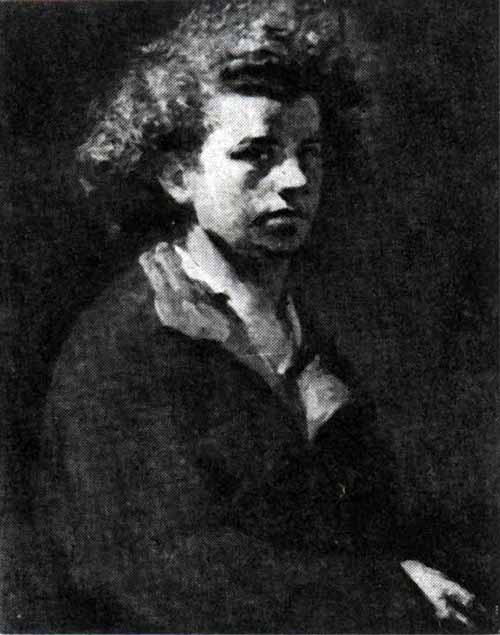Maximov Vassily (1844-1911)
VM Maksimov was born into a peasant family. Sooner lost his parents, was apprenticed to the icon-painting workshop, where he received his first lessons in painting. In 1863, Maximov entered the St. Petersburg Academy of Arts volunteer, and in 1864 became a member of the Art Cooperative, led by PA Krestonostsevym. Artel was organized "for joint working and living" like the farm I. Kramskoy , but lasted just over a year. Written Maximov while painting "The Sick Child" (1864) was awarded the Gold Medal of Arts "for the expression." Going all the academic course of three years, the artist refused to contest for a gold medal as a group once refused to "fourteen", headed by I. Kramskoi . "My beliefs do not make me go to the competition - he said - I am opposed to traveling abroad, because I want to learn Russian at first and the poor Russian village, which nobody knows, does not know the needs of the rural and grief." Received in 1866 the title of the class artist third degree, Maksimov left the walls of the Academy of Arts and went to the village Shubine Tver province, to the estate of Golenischeva-Kutuzov, to the position of drawing teacher. In the summer of the same year made a trip but the Volga, which left a lot of vivid impressions of life of the people. He later said Pavel Tretyakov, that "did not write the city ladies in silk dresses, uniformed workers and other unfamiliar people and moved permanently to village life." His work "Grandma's Tales" (1867), shown at the exhibition OPH was prized and at the same time bought for the Tretyakov Art Gallery. However, the most complete talent Maximova revealed in "The Sorcerer Arriving at a Peasant Wedding" (1875). This epic of national life, with an abundance of characters created by "chorus beginning," noted a deep knowledge of rural life. Poetic images of the bride and groom, hawk profile wizard, expressive types elderly written with specific people and characterized by a large vital truth. The peasants themselves, posed Maximov told him: "You are ours, and if you write, it is not for fun." In the film "Sick Husband" (1881), the artist went close to him theme, depicting the patient rustic peasant pas couch, in the house where the icons bent mournful female figure. During these years, Maximov created a series of paintings dedicated to life of the poor, the share of heavy peasant: "Poor food" (1879), "The auction for back taxes" (1880), "Loan bread" (1882), "The Blind boss" (1884) "At its lane" (1891), "Dashing-in-law" (1893). About these works the artist Kramskoy said: "Yes, yes, the people wrote his picture. <...> Here, genre painters who are learning." The atmosphere of the village post-reform, the expansion of patriarchal life Maximov showed in his work "Family Section" (1876), depicting the division of property between the two brothers. Self-interest and greed, on the one hand, and the vulnerability and humility - on the other. This is an eternal theme is particularly strong expression in the female characters: the disadvantaged and deceived her younger daughter, whose appearance has affected women's tradition of poetic types Venetsianov , artist contrasted greedy and foolish wife of his older brother. "Flint peredvizhnichestva" "the most adamant stone of its foundation" - the so-called Maximov I. Repin . Member I traveling exhibition, which was unanimously adopted in November 1872 in the ranks of the Association of Traveling Art, the artist has devoted all his works the image of the people. Among the important works of Maximova stands somewhat apart from the central themes of his work painting "All in the Past" (1889). Imbued with nostalgia for a past age, she continues the motif of Turgenev endangered "Noble Nest". The artist depicts a scene in an old manor house with boarded aristocratic survivors of the once best of times, but now they only reminiscent of the former owner had moved to farmhouse and resting in a chair under his windows. Feeble, but the majestic figure of the old lady, lost in memories, it becomes even more eloquent opposition from the touching look of her companion - an old peasant woman, sadly whiling away the days near her mistress. The picture was a great success and has been repeated many times by the artist. The last two decades of his life were full of Maximova bitter poverty and deprivation. Survivor of his themes (to replace the Wanderers came artists new directions), he almost did not find buyers and customers, was still writing stories of peasant life, and shortly before his death, began painting "Forgiveness Sunday", but did not finish it. Poverty, exhaustion, illness brought the artist to the grave. However, in the history of Russian art Maximov took its rightful place as a chronicler and connoisseur of national life.
The artworks |
code at our gallery
artist Maximov Vassily , Russian artist Maximov Vassily , about the artist Maximov Vassily , Information about artist Maximov Vassily
watch also | ||||||||||||









